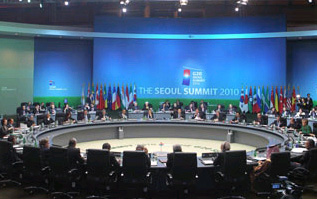With fears of a looming currency war, the G20 leaders agreed on a framework for balanced growth and a move towards market-determined exchange rates.
Top US negotiators say they succeeded by getting everyone on the same page.

World leaders at G20 Summit's opening plenary session (AFP photo/ HO/ SEOUL G20 Media Pool)
US Under Secretary of the Treasury for International Affairs Lael Brainard said: "...In particular, allowing exchange rates to move in accordance with market forces. And we felt coming out of that, that there was agreement, that all the leaders signed up for that framework".
US language angled at China and obliging nations to avoid "competitive undervaluation" was booted out of the final G20 text, along with a US proposal for nations to limit current account deficits or surpluses to less than four per cent of GDP.
Samuels International Associates' Sourabh Gupta said: "The Americans are no longer, and for quite a while I would suggest, able to force their dictates through in the international economic order, that'll necessarily have to work a consensus among the key power centres".
During the talks Germany joined emerging nations in accusing the US of double standards after the Federal Reserve decided to to buy up US$600 billion in Treasury bonds days before the G20.
The Fed has mounted an unusually public defence, asserting its impartiality from political matters and its desire to avoid another recession.
Federal Reserve chairman Ben Bernanke said: "On its current economic trajectory, the United States runs the risk of seeing millions of workers unemployed or underemployed for many years. As a society, we should find that outcome unacceptable."
But fiscal conservatives here say the criticism is justified.
Heritage Foundation research fellow Derek Scissors said: "The American position here is unfortunate. We keep saying the world has to make sacrifices and be disciplined and we don't want to be disciplined.
"We'll do that later. You have to give up one or the other".
Many officials here understand China's desire to move at a pace which doesn't threaten its economic stability, even if they don't necessarily agree with it.
But the administration will still be under domestic pressure to confront China, name it a "currency manipulator" and even impose additional duties designed to counteract the impact of the weaker Yuan on American manufacturers.
CNA/wk


























